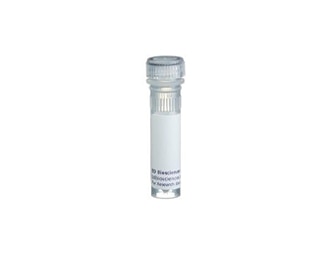Old Browser
Looks like you're visiting us from {countryName}.
Would you like to stay on the current country site or be switched to your country?


Regulatory Status Legend
Any use of products other than the permitted use without the express written authorization of Becton, Dickinson and Company is strictly prohibited.
Preparation And Storage
Recommended Assay Procedures
For immunohistochemical staining of cells expressing MHC class I antigen of the b haplotype, we recommend the use of the biotinylated anti-mouse H-2Kb mAb AF6-88.5 in our special formulation for immunohistochemistry, Cat. no. 550550.
Product Notices
- Since applications vary, each investigator should titrate the reagent to obtain optimal results.
- Please refer to www.bdbiosciences.com/us/s/resources for technical protocols.
- Caution: Sodium azide yields highly toxic hydrazoic acid under acidic conditions. Dilute azide compounds in running water before discarding to avoid accumulation of potentially explosive deposits in plumbing.
The 28-14-8 antibody reacts with the α3 domain of the H-2D[b] MHC class I alloantigen. The antibody binds to H-2D[b] in the presence or absence of the β2 microglobulin chain. It cross-reacts with the α3 domain of H-2L[d], but not with K[d] or D[d], and with H-2D[q] and/or L[q]. Reactivity with haplotypes k, f, p, r, and s has not been observed. mAb 28-14-8 has been shown to block H-2L[d]- specific and H- 2L[d]-restricted antigen-specific lysis of target cells by cytotoxic T lymphocytes (CTL), but it does not block recognition of H-2L[d] positive target cells by Ly-6G2-positive NK cells.
Development References (9)
-
Allen H, Fraser J, Flyer D, Calvin S, Flavell R. Beta 2-microglobulin is not required for cell surface expression of the murine class I histocompatibility antigen H-2Db or of a truncated H-2Db. Proc Natl Acad Sci U S A. 1986; 83(19):7447-7451. (Clone-specific: Immunoprecipitation). View Reference
-
Allen H, Wraith D, Pala P, Askonas B, Flavell RA. Domain interactions of H-2 class I antigens alter cytotoxic T-cell recognition sites. Nature. 1984; 309(5965):279-281. (Clone-specific: Radioimmunoassay). View Reference
-
Evans GA, Margulies DH, Shykind B, Seidman JG, Ozato K. Exon shuffling: mapping polymorphic determinants on hybrid mouse transplantation antigens. Nature. 1982; 300(5894):755-757. (Clone-specific: Radioimmunoassay). View Reference
-
Kündig TM, Bachmann MF, DiPaolo C. Fibroblasts as efficient antigen-presenting cells in lymphoid organs. Science. 1995; 268(5215):1343-1347. (Clone-specific: Blocking). View Reference
-
Mason LH, Ortaldo JR, Young HA, Kumar V, Bennett M, Anderson SK. Cloning and functional characteristics of murine large granular lymphocyte-1: a member of the Ly-49 gene family (Ly-49G2). J Exp Med. 1995; 182(2):293-303. (Clone-specific: Blocking). View Reference
-
Orn A, Goodenow RS, Hood L. Product of a transferred H-2Ld gene acts as restriction element for LCMV-specific killer T cells. Nature. 1982; 297(5865):415. (Clone-specific: Blocking). View Reference
-
Ozato K, Hansen TH, Sachs DH. Monoclonal antibodies to mouse MHC antigens. II. Antibodies to the H-2Ld antigen, the products of a third polymorphic locus of the mouse major histocompatibility complex. J Immunol. 1980; 125(6):2473-2477. (Immunogen: Cytotoxicity). View Reference
-
Ozato K, Sachs DH. Monoclonal antibodies to mouse MHC antigens. III. Hybridoma antibodies reacting to antigens of the H-2b haplotype reveal genetic control of isotype expression. J Immunol. 1981; 126(1):317-321. (Immunogen: Cytotoxicity). View Reference
-
Woodward JG, Orn A, Harmon RC, Goodenow RS, Hood L, Frelinger JA. Specific recognition of the product of a transferred major histocompatibility complex gene by cytotoxic T lymphocytes. Proc Natl Acad Sci U S A. 1982; 79(11):3613-3617. (Clone-specific: Blocking). View Reference
Please refer to Support Documents for Quality Certificates
Global - Refer to manufacturer's instructions for use and related User Manuals and Technical data sheets before using this products as described
Comparisons, where applicable, are made against older BD Technology, manual methods or are general performance claims. Comparisons are not made against non-BD technologies, unless otherwise noted.
For Research Use Only. Not for use in diagnostic or therapeutic procedures.
Report a Site Issue
This form is intended to help us improve our website experience. For other support, please visit our Contact Us page.